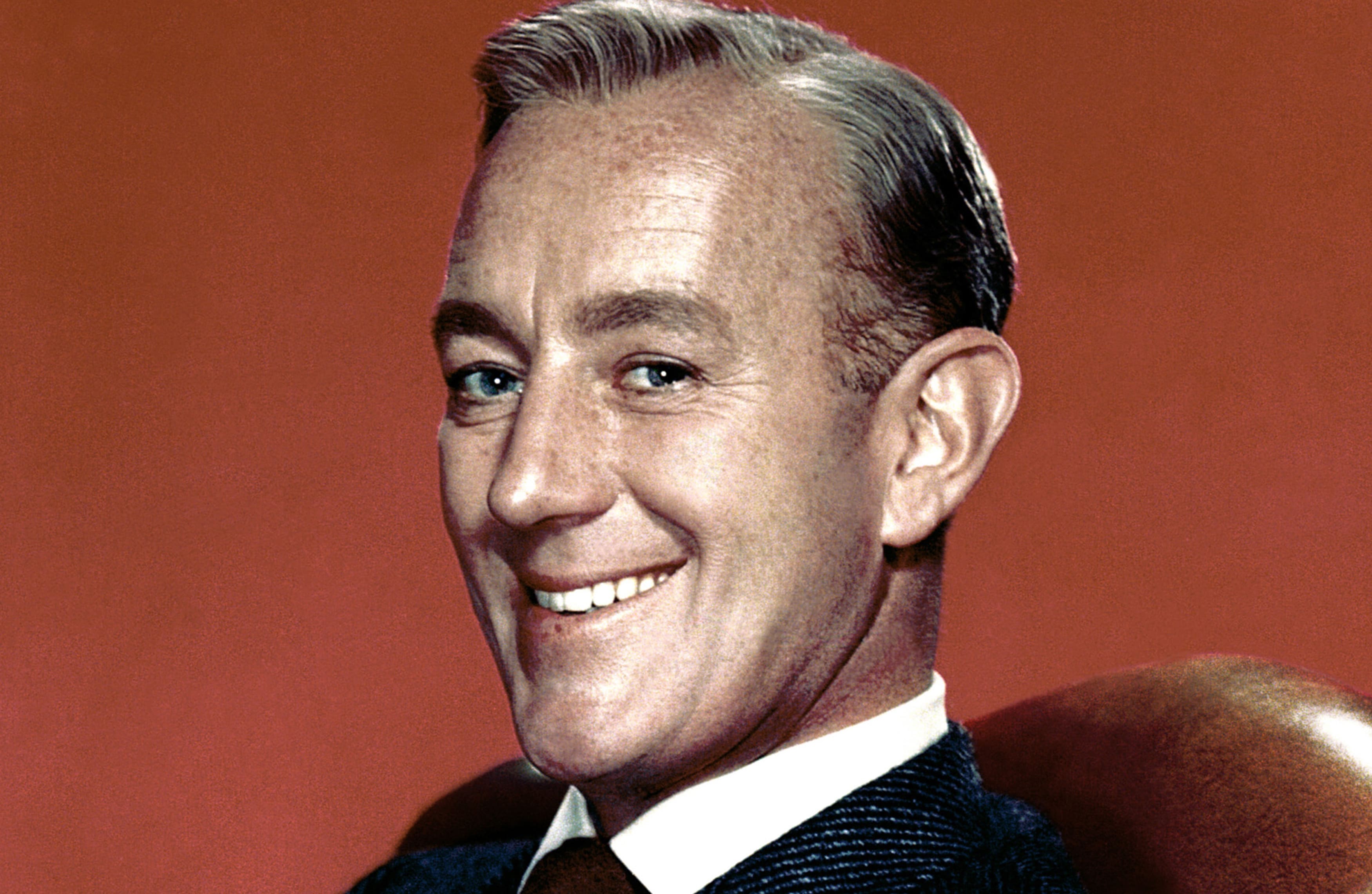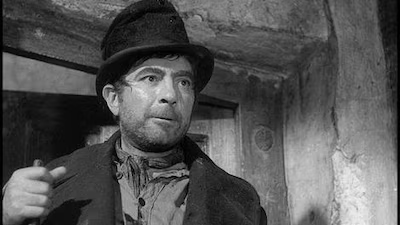Alec Guinness

About
Biography
Filmography
Family & Companions
Bibliography
Notes
"I shrivel up a little every time someone mentions 'Star Wars' to me." --Guinness quoted in Talk, October 1999.
Guinness received an honorary doctorate (DFA) from Boston College in 1962.
Biography
Sir Alec Guinness, acting's preeminent master of disguise, first drew attention as Fagin, providing a wonderfully Dickensian performance that totally concealed the actor within in David Lean's "Oliver Twist" (1948). His most dramatic display of versatility came playing eight roles, including a woman, in "Kind Hearts and Coronets" (1949), a film that established him beyond a shadow of a doubt as an expert at make-up and deception. Whether he was an English prime minister (Disraeli in "The Mudlark" 1950), an Arab prince ("Lawrence of Arabia" 1962), a despicable despot (Hitler in "The Last Ten Days" 1973) or an Indian professor ("A Passage to India" 1984), Guinness demonstrated a chameleon-like ability to disappear so completely within the role that filmgoers forgot they were watching an actor and saw the character instead.
A founding member of the Ealing Film Studios repertory company, he gained wide popularity in their string of bright British comedies and was particularly appealing as the shy inventor in Alexander Mackendrick's "The Man in the White Suit" (1951). He secured an Oscar nomination as Best Actor in "The Lavender Hill Mob" (1951) but also excelled in dramatic portrayals, earning a Best Actor Academy Award for his thoughtful rendering of an English soldier bureaucrat in David Lean's "The Bridge on the River Kwai" (1957). His love for Joyce Carey's ribald novel "The Horse's Mouth" led him to adapt it for the screen in 1959, a labor which earned him an Academy Award nomination for the only screenplay he would ever write. The film also afforded him an outrageous turn as its monstrously comic painter Gully Jimson. That same year, Queen Elizabeth II also knighted him for his achievements on stage and screen.
Guinness resisted any temptation to move to Hollywood, preferring instead his native England where he often appeared on stage between movies. He tackled a variety of modern parts in addition to much of the Shakespeare canon and, though rarely treading the boards in the USA, did win a Tony Award for portraying Dylan Thomas in "Dylan" (1964). Success was his own worst enemy, and the decade following Lean's "Dr. Zhivago" (1965) was his most lackluster as he suffered through a spate of poor films and showy parts (i.e., "Cromwell" 1970, in which our sympathies wrongly go to his Charles I). He rebounded as the wise Obi-Wan Kenobi in George Lucas' "Star Wars" (1977), receiving an Oscar nomination as Best Supporting Actor (and 2-1/4 percent of the films profits). "Star Wars" introduced him to a new generation of moviegoers and his line "May the force be with you" found its way into the popular lexicon.
Guinness scored his greatest television success in 1979 when he created the role of veteran spy George Smiley in John LeCarre's "Tinker, Tailor, Soldier, Spy" (aired in the USA on PBS' "Great Performances" in 1980) which he later reprised in "Smiley's People" (1982). Returning full circle to his cinematic beginnings with "Little Dorrit," an adaptation from Dickens, he earned yet another Oscar nomination as Best Supporting Actor in the role of William Dorrit, the title character's imprisoned father.
Although not retired from acting, he has worked less frequently in the 1990s, concentrating much of his time on his memoirs, published in two volumes, "Blessings in Disguise" (1985) and "My Name Escapes Me" (1997).
Filmography
Cast (Feature Film)
Writer (Feature Film)
Cast (Special)
Cast (Short)
Cast (TV Mini-Series)
Life Events
1934
Film acting debut in "Evensong"
1934
Stage acting debut as walk-on
1939
Played Herbert Pocket in stage production of "Great Expectations" which he also adapted
1941
Served in Royal Navy during WWII; Enlisted as able seaman; commissioned as lieutenant the following year
1942
Given leave for New York stage debut on Broadway in "Flare Path", a propaganda play
1946
Returned to films in David Lean's "Great Expectations"; began acting steadily in features
1948
Drew attention as Fagin in Lean's "Oliver Twist"
1949
Played eight parts, including a woman, in Robert Hammer's "Kind Hearts and Coronets"
1951
Nominated for a Best Actor Academy Award for Charles Crichton's "The Lavender Hill Mob"
1951
Portrayed the inventor in Alexander Mackendrick's "The Man in the White Suit"
1953
Starred as the captain with two wives in different ports in "Captain's Paradise"
1957
Won Best Actor Oscar for his thoughtful rendering of an English bureaucrat soldier in Lean's "The Bridge on the River Kwai"
1959
Scripted adaptation of Joyce Carey's "The Horse's Mouth"; also delivered a superb, monstrous rendering of lead character Gully Jimson; received Oscar nomination for Best Adapted Screenplay
1959
Knighted by Queen Elizabeth II
1962
Reunited with Lean for "Lawrence of Arabia"
1964
Played Marcus Aurelius in Anthony Mann's "The Fall of the Roman Empire"
1965
Reteamed with Lean as Zhivago's brother in "Dr. Zhivago"
1970
Portrayed Charles I in Ken Hughes' "Comwell"
1972
Appeared as Pope in Franco Zeffirelli's "Brother Sun, Sister Moon"
1973
Cast as Hitler in Ennio de Concini's "The Last Ten Days"
1977
Played Obi-Wan Kenobi in "Star Wars"; received Oscar nomination for Best Supporting Actor; also given 2-1/4 percent of the profits by director George Lucas
1979
Created role of John LeCarre's George Smiley in "Tinker, Tailor, Soldier, Spy" on BBC (aired in USA on PBS' "Great Performances" in 1980)
1982
Reprised Smiley in "Smiley's People"
1984
Final collaboration with Lean, played an Indian professor in the screen adaptation of E M Forester's "A Passage to India"
1985
Received Oscar nomination as Best Supporting Actor for role of William Dorrit in "Little Dorrit"
1985
Published first volume of memoirs, "Blessings in Disguise"
1991
Appeared as the chief clerk in Steven Soderbergh's fantasy thriller "Kafka"
1993
Co-starred with Leo McKern, Jeanne Moreau and Lauren Bacall in the BBC production "A Foriegn Field" (aired in USA on PBS in 1994)
1997
Published second memoir, "My Name Escapes Me"
Photo Collections
Videos
Movie Clip












Trailer












Family
Companions

Bibliography
Notes
"I shrivel up a little every time someone mentions 'Star Wars' to me." --Guinness quoted in Talk, October 1999.
Guinness received an honorary doctorate (DFA) from Boston College in 1962.
He received an honorary doctorate (DLitt) from Oxford University in 1978.











